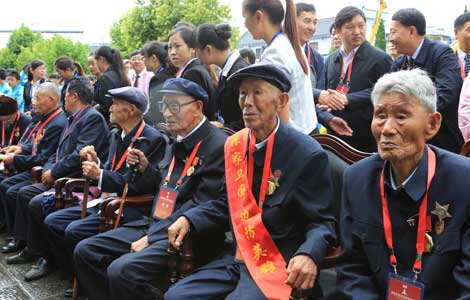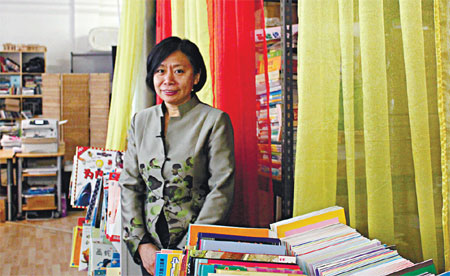Immigrant businesswomen in the spotlight
Updated: 2013-08-16 11:58
By Kelly Chung Dawson in New York (China Daily)
|
||||||||
|
The demand for books and education products of American families who adopted Chinese children inspired Xiaoning Wang, an immigrant from China, to start her business. Nusha Balyan / The Story Exchange |
Success stories about female entrepreneurs in the mainstream media are usually large in scale and revenue, spotlighting millionaires like Oprah and Martha Stewart. While their stories are inspiring in the abstract, studies have shown that when a woman's success reaches a level that feels unachievable, her impact and function as a role model for other women becomes diluted. For female immigrants, a dearth of real-life role models can make a dream of entrepreneurial success feel that much more out of reach.
Xiaoning Wang, founder of the education and cultural product company China Sprout, is featured in a short film released online this week by web-based NGO The Story Exchange (TSE). The video is part of a series called "Immigrant Entrepreneurs," and aims to highlight the lesser-known stories of individual women who have found small-scale success as business owners after immigrating to the US.
According to the Economic Census' 2012 Survey of Business Owners, more than 1 million female business owners (or around 13 percent of all female business owners) in the US today are immigrants. Their stories have remained under the radar because their success is of a less flashy scale, but their presence has grown steadily across the US.
"These numbers indicate that there is a quiet revolution of immigrant women's business ownership that is organically growing, but is going relatively unnoticed in the culture at large," said Susan C. Pearce, co-author of the book Immigration and Women: Understanding the American Experience and a research associate with the Center for Diversity and Inequality Research at East Carolina University, in an official statement from The Story Exchange.
"Anytime you have a business who is hiring other people they are actually increasing jobs for the economy and then those people are becoming consumers. It has a multiplier effect," Pearce said.
Sue Williams, executive director of The Story Exchange and owner of documentary film-production company Ambrica Productions, believes that almost all issues women face in the US tie directly to their ability to take control of their economic circumstances. Women perform 66 percent of the world's work but earn 10 percent of the world's income, she noted.
"At The Story Exchange we are gathering stories and analyzing data in hopes of qualitatively and quantitatively understanding the women who start businesses in the US," she said. "Women often deal with issues of self-confidence and it holds them back, because the common narrative of entrepreneurship is male-defined as being high-gross, high-risk, and that's something most women can't relate to."
Many female immigrants aren't even sure if they can stay in the country, so the idea of starting a business can be extremely daunting. The good news for female business owners is that when women start businesses in the US, they succeed at the same rate as men, Williams said.
The Story Exchange chose Xiaoning Wang for her acumen as a small-business owner, and the relatable nature of her story. Wang grew up in Beijing, learned English from the radio and later joined IBM before moving to New York with her husband. While visiting New York City parks with her son, she met various families who had adopted baby girls from China and were eager for information about her home country.
Wang founded China Sprout to sell Chinese books, art and education items to families with adopted Chinese children; her inventory quickly increased to more than 8,000 products from 100. When the adoption market slowed, she changed her focus from adoption materials to Chinese-language education products for a general market.
In the TSE video, she talks about work-life balance.
"My life is my work, so my work is my life," she says. "I don't balance well, I have to say. But the other side is that it's very rewarding, American families who adopt Chinese children always say 'It was you who brought us so many things so our girls could learn about China, learn Chinese culture. It's not just about making money, it's about something meaningful."
For Williams, who directed the short film with TSE co-founder Victoria Wang, Xiaoning Wang represents the many women who are bridging cultural gaps between the US and Chinese markets. Through her work in China as a documentary filmmaker for PBS, Williams has encountered many young women in rural areas who have the intelligence and the drive but have simply lacked for role models, she said. That's often true for young Chinese women new to the US, she said.
"It was important to us that we feature businesswomen who people could see themselves in, because we've realized that in the ongoing immigration debate we are losing sight of the people at the heart of it, whose lives will be most impacted," Williams said. "We want to change the narrative. It's not all Oprah Winfrey and Vera Wang; it's women you can relate to in your neighborhood. It's women like Xiaoning."
TSE's "Immigrant Entrepreneurs" video series is available on the website at thestoryexchange.org, which has also featured Hong Kong restaurateur Anna Chau, cake shop chain owner Lyn Lee, and food and beverage distributor Puifung Leung, among others.
(China Daily USA 08/16/2013 page11)

 Thrills in store for Chicago Air and Water Show
Thrills in store for Chicago Air and Water Show
 Demolition work starts on rooftop villa structure
Demolition work starts on rooftop villa structure
 Memorial to expeditionary soldiers opens
Memorial to expeditionary soldiers opens
 Death toll from Egypt violence rises to 638
Death toll from Egypt violence rises to 638
 Tunes that travel
Tunes that travel
 Macabre Addams Family tests musical tastes
Macabre Addams Family tests musical tastes
 Spielberg has desire to work with Zhang Yimou
Spielberg has desire to work with Zhang Yimou
 Li Na advances to 3rd round at Cincinnati Open
Li Na advances to 3rd round at Cincinnati Open
Most Viewed
Editor's Picks

|

|

|

|

|

|
Today's Top News
Exporters take heart from signs of US rebound
Clinton: US behind China in Africa
Chinese reduce Treasury holdings
Canadian deal boosts Chinese aircraft ambitions
The 'bad boys from Boston' are set to rock Shanghai
Global universities ranked by survey
No remorse as Abe marks surrender anniversary
China to be world's No 1 consumer
US Weekly

|

|








